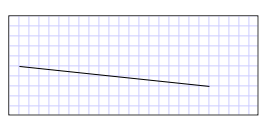Note
Access to this page requires authorization. You can try signing in or changing directories.
Access to this page requires authorization. You can try changing directories.
This example shows how to create a line segment. To create a line segment, use the PathGeometry, PathFigure, and LineSegment classes.
Example
The following examples draw a LineSegment from (10, 50) to (200, 70). The following illustration shows the resulting LineSegment; a grid background was added to show the coordinate system.
 A LineSegment drawn from (10,50) to (200,70)
A LineSegment drawn from (10,50) to (200,70)
In Extensible Application Markup Language (XAML), you may use attribute syntax to describe a path.
<Path Stroke="Black" StrokeThickness="1"
Data="M 10,50 L 200,70" />
(Note that this attribute syntax actually creates a StreamGeometry, a lighter-weight version of a PathGeometry. For more information, see the Path Markup Syntax page.)
In XAML, you may also draw a line segment by using object element syntax. The following is equivalent to the previous XAML example.
<Path Stroke="Black" StrokeThickness="1">
<Path.Data>
<PathGeometry>
<PathFigure StartPoint="10,50">
<LineSegment Point="200,70" />
</PathFigure>
</PathGeometry>
</Path.Data>
</Path>
PathFigure myPathFigure = new PathFigure();
myPathFigure.StartPoint = new Point(10, 50);
LineSegment myLineSegment = new LineSegment();
myLineSegment.Point = new Point(200, 70);
PathSegmentCollection myPathSegmentCollection = new PathSegmentCollection();
myPathSegmentCollection.Add(myLineSegment);
myPathFigure.Segments = myPathSegmentCollection;
PathFigureCollection myPathFigureCollection = new PathFigureCollection();
myPathFigureCollection.Add(myPathFigure);
PathGeometry myPathGeometry = new PathGeometry();
myPathGeometry.Figures = myPathFigureCollection;
Path myPath = new Path();
myPath.Stroke = Brushes.Black;
myPath.StrokeThickness = 1;
myPath.Data = myPathGeometry;
Dim myPathFigure As New PathFigure()
myPathFigure.StartPoint = New Point(10, 50)
Dim myLineSegment As New LineSegment()
myLineSegment.Point = New Point(200, 70)
Dim myPathSegmentCollection As New PathSegmentCollection()
myPathSegmentCollection.Add(myLineSegment)
myPathFigure.Segments = myPathSegmentCollection
Dim myPathFigureCollection As New PathFigureCollection()
myPathFigureCollection.Add(myPathFigure)
Dim myPathGeometry As New PathGeometry()
myPathGeometry.Figures = myPathFigureCollection
Dim myPath As New Path()
myPath.Stroke = Brushes.Black
myPath.StrokeThickness = 1
myPath.Data = myPathGeometry
This example is part of larger sample; for the complete sample, see the Geometries Sample.
See also
.NET Desktop feedback
